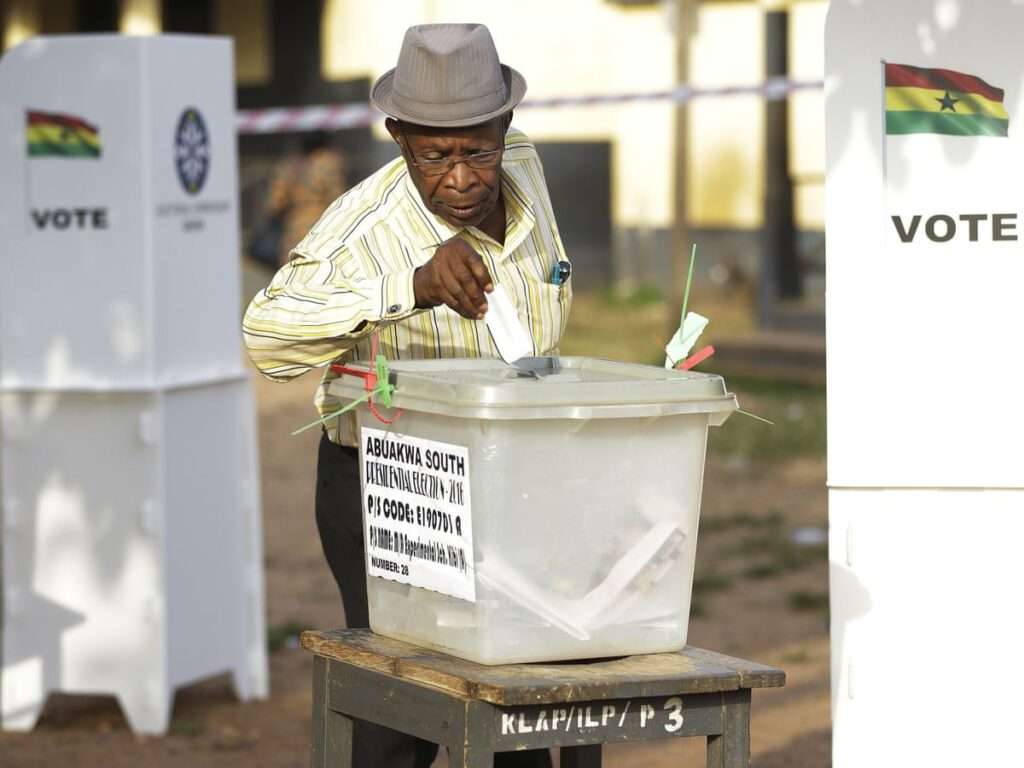In an exclusive interview with The Vault News, Dr. Samuel Adu-Gyamfi, a Political Historian from the Department of History and Political Studies at Kwame Nkrumah University of Science and Technology, provided a comprehensive analysis of the potential implications of having Dr. Matthew Opoku Prempeh and Prof. Jane Naana Opoku Agyemang as key players in the forthcoming Ghana elections.
The discussion shed light on how their past performances and future promises could significantly influence political dynamics and voter decisions in Ghana. Dr. Adu-Gyamfi began by emphasizing the crucial role of vice-presidential candidates in shaping voter decisions.
“I think it’s an important call for those who are going to vote, based on running mate, to appreciate what type of vice president or kind of vice president you want to have, by 7th January 2025.”
Dr. Samuel Adu-Gyamfi, a Political Historian from the Department of History and Political Studies at KNUST
This insight underscores the need for voters to carefully consider the qualifications and capabilities of the vice-presidential candidates, as their roles could greatly impact governance and policy implementation.
Dr. Adu-Gyamfi highlighted the contributions and challenges associated with the educational policies of both candidates. He noted that the National Democratic Congress (NDC) initiated the e-blocks and piloted free education programs, which aimed to provide educational opportunities to underserved communities.
However, Dr. Adu-Gyamfi noted that the New Patriotic Party (NPP) expanded upon these initiatives with the implementation of the Free Senior High School (SHS) policy. While this policy aimed to ensure universal access to secondary education, it faced several challenges.
“The realities are obvious, where students who are going to school with their blue, green, yellow, groupings and all that, spent more time at home and less time in school,” Dr. Adu-Gyamfi observed.
Dr. Adu-Gyamfi further explained that the aggregate years students spent in school were reduced, which impacted the overall effectiveness of the policy. Despite these challenges, both Dr. Matthew Opoku Prempeh and Prof. Jane Naana Opoku Agyemang made significant contributions to the education sector during their respective tenures.
Beyond the Education Sector
Dr. Adu-Gyamfi contrasted the broader governmental experience of Dr. Matthew Opoku Prempeh with the academic-focused background of Prof. Jane Naana Opoku Agyemang. While Dr. Prempeh has served in both the education and energy sectors, Prof. Agyemang’s experience is primarily rooted in academia.
“Can you go beyond the education sector and place Prof. Jane Naana Opoku Agyemang in any of the sectors of government? No,” Dr. Adu-Gyamfi asserted. However, he acknowledged that Dr. Prempeh’s experience in multiple sectors gives him a more comprehensive understanding of government operations.
Dr. Adu-Gyamfi also addressed the criticisms faced by Dr. Prempeh, particularly in the energy sector. The resurgence of ‘Dumso’ (power outages) and his controversial comments about the Volta region and sea defense issues have posed challenges to his political image.
Despite these hurdles, Dr. Adu-Gyamfi believes that Dr. Prempeh’s knowledge of government functions and ability to provide oversight could make him a valuable vice-presidential candidate.
Turning to Prof. Jane Naana Opoku Agyemang, Dr. Adu-Gyamfi highlighted her historical significance as the first female Vice-Chancellor of the University of Cape Coast (UCC). Her tenure as Vice-Chancellor showcased her ability to manage academics and intellectuals, demonstrating her leadership and administrative skills.
“She has had the opportunity to serve. And I think she served well,” Dr. Adu-Gyamfi remarked, emphasizing the challenges and successes of her academic leadership.
Dr. Adu-Gyamfi stressed the importance of critiquing political figures based on their substantive contributions rather than resorting to disrespectful or vulgar language. He advocated for informed and coherent criticism, encouraging voters to evaluate candidates based on their potential and past performance rather than personal attacks.
Political Dynamics and Regional Influence
The regional influence of both candidates also plays a significant role in their political appeal. Dr. Matthew Opoku Prempeh, hailing from the Ashanti region, brings a strategic advantage to the NPP, consolidating votes in a region known for its loyalty to the party.
“The decision to pick an Asante man as a running mate is strategic, aiming to whip the base votes in the Ashanti region into line.”
Dr. Samuel Adu-Gyamfi, a Political Historian from the Department of History and Political Studies at KNUST
Prof. Jane Naana Opoku Agyemang, representing the Central region, brings a different kind of demographic appeal. As a female candidate, she has the potential to galvanize a significant portion of the electorate, particularly women in the informal sector, Dr. Adu-Gyamfi highlighted
“Prof. Jane Naana Opoku Agyemang presents a gender demographic, which is the largest in Ghana. The informal sector economy, especially in the Central region, is very significant, and her candidacy could positively influence their votes.”
Dr. Samuel Adu-Gyamfi, a Political Historian from the Department of History and Political Studies at KNUST
Potential Impact on Voter Decisions

As the elections approach, the potential impact of these candidates on voter decisions cannot be underestimated. Their respective strengths and weaknesses will play a crucial role in shaping the political landscape.
Dr. Adu-Gyamfi believes that informed judgments should be made based on their past performances and future promises, rather than personal attacks.
“These two individuals come to the table with a lot of substance. Their opponents will have things to hold against them, but these must be viewed scientifically and argued coherently.”
Dr. Samuel Adu-Gyamfi, a Political Historian from the Department of History and Political Studies at KNUST
The nominations of Dr. Matthew Opoku Prempeh and Prof. Jane Naana Opoku Agyemang add a significant dimension to Ghana’s political landscape. Dr. Matthew Opoku Prempeh brings a wealth of experience from both the education and energy sectors, along with strategic regional influence while Prof. Jane Naana Opoku Agyemang offers a unique demographic appeal, particularly among women, and a proven track record in academia.
Their ability to navigate the complexities of Ghanaian politics, address controversies, and leverage their strengths will be pivotal in the upcoming elections. As Dr. Adu-Gyamfi aptly put it, “Both Prof. Jane Naana Opoku Agyemang and Dr. Matthew Opoku Prempeh are charismatic in their own right. They have the potential to impact their campaigns and governance when the opportunity arises. Let the better candidate win, and may they both have a good fight and a good run for their money.”
The evolving political landscape of Ghana is set for an intriguing contest, with both running mates poised to make significant contributions to their respective campaigns and potentially, the future governance of the nation. As voters prepare to make their decisions, the legacies and promises of these candidates will undoubtedly play a crucial role in shaping the outcome of the elections.
READ ALSO: No ‘Honeymoon’ For New Labour Government




















